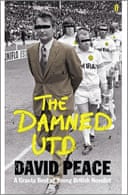The Damned Utd
by David Peace
350pp, Faber, £12.99
The 44 days in 1974 that Brian Clough spent as manager of Leeds United - what a great idea for a novel. It's self-contained disaster, farce and tragedy in one, as short, sharp and effective as the knee injury that ended the man's playing career. "Come on, ref," laughs Bob Stokoe, the Bury centre-half. "He's fucking codding is Clough." He wasn't, and turned to management instead, being bossy, loud and opinionated and making a noise as a television celebrity at a time when managers were still supposed to look like policemen. That said, there was always something of the bent copper about Clough.
The Damned Utd impresses for tackling a subject that usually eludes fiction - football, like film and popular music, is too much part of the collective fantasy. Football managers in their hubris offer more dramatic possibilities than their linguistically challenged players. Puppet-masters condemned to the sidelines, they are caught up in a play of control, destiny and impotence that affords Shakespearean possibilities: Taylor, Redknapp, Atkinson and Pleat in a bad rep version of one of the lesser comedies; Hoddle in Troilus and Glenda, sulking in his tent; Sven and Nancy as one of the problem plays; Fergie a full-blown, crimson-faced Scottish Lear, with Cantona and Keane his Goneril and Regan, Giggs his Cordelia. No Prospero unless it's Martin O'Neill or his mentor Brian Clough, a man not without a touch of the Calibans, someone sufficiently aware to have been conscious of the tragic dimension of his rise and fall and played it to the hilt.
David Peace has made a name raiding fact for fiction, reworking the past first in his Red Riding quartet, then in his chronicle of the miners' strike, GB84. With The Damned Utd he disperses any lingering suspicion that he might be Cliff Richard to James Ellroy's Elvis. By using real people and events, he avoids awkward problems of suspension of disbelief; making sure most of his protagonists are dead and can't sue is also smart, not that Clough would have grounds for complaint. Peace has done him proud in this book, warts and all.
Peace's impersonation of Clough is a skilful act of ventriloquism, which makes imaginative use of a troubled inner voice: "jobless and boozing, fat and fucked, you are in hell". If Clough's public image owed something to Muhammad Ali and Arthur Scargill, Ian Paisley was in there too. A revivalist tone places The Damned Utd in a tradition of Puritan literature stretching back to Bunyan, written in the expectation of tribulation and disappointment.
Football was still a god-fearing game in Clough's day, the bully boys of Leeds its first mercenary crusading army. Their manager, Don Revie, looked like a handsome-kit version of Les Dawson without an ounce of humour. "The Don" had made Leeds in his image, a hard-hearted, mean-spirited winning machine that cheated. When Revie moved on to what would turn out to be a less successful tenure at England, Brian Clough - young and successful, having made champions of Derby - was the next pretender.
Clough was one of the great, complex egos of the game. He embodied many of the forthcoming dilemmas of Thatcher's Britain, his career a constant argument between self-proclamation and partnership, between probity and the demon drink, between financial irregularity and the belief that football was about more than acquisition. The Damned Utd shows what Clough's tragedy was: deep down, he knew that winning was only loss deferred. In Peace's book, football is a game founded on fear. Leeds were the great intimidators and Clough's first meeting with the players - "a gang of apes after a fuck" - is a fine paranoid scene of territorial confrontation.
The Cromwellian Revie was right to recognise his rival's self-destructive streak. Clough never should have gone to Leeds, and he knew it. The 44-day disaster was founded on a misguided belief that it was possible to change the soul of a team, an alchemy beyond even Clough's talents. Football becomes irrelevant to the drama that takes place behind closed doors, suggesting that for its players it is hardly a spectator sport at all, beyond the raw endorsement of the crowd. Like or dislike of football is neither here nor there, and Peace is smart enough to work on that, achieving the broad grandiosity of a Sergio Leone film. The boy done brilliant.
· Chris Petit's The Passenger is published by Simon & Schuster. To order The Damned Utd for £11.99 with free UK p&p call Guardian book service on 0870 836 0875 or go to theguardian.com/bookshop
